Indeed, C is the mother of all programming languages used in every application like finance, education, networking, and management. As a result, no matter what job you apply for, the best knowledge of C programming is always an advantage. Moreover, if you are looking for Top C Programming Interview Questions you Need to Master in 2023, you have come to the perfect destination. The most tricky, important C interview questions for freshers and experienced that will assist you to improve your abilities around the array, string, algorithmic, and so on are available on this platform.

Below are the latest C programming Interview Questions & Answers needed for fresher, intermediate, and experienced candidates
1. Why is C programming referred to as the mother language?
Firstly, a very important question usually asked in C programming interview questions for freshers is why C is the mother language. Generally, most of the compilers and Java virtual machines used today are in the C language. However, the majority of programming languages created after the C language, such as C++, Python, and Rust, have been heavily influenced by it. In addition, programming concepts like variables, data types, loops, arrays, functions, handling of files, dynamic memory allocation, and pointers were all introduced by the C programming language. Obviously, many languages like C++, Java, and C# still use the majority of these concepts.
2. List the basic data types that support the c programming language?
Specifically, in C, the term “data type” refers to a comprehensive system for declaring variables or functions of various types. Therefore, this type of variable dictates how much storage space it takes up.
We can know the interpretation of the stored bit pattern obviously from this. The data types in the C programming language are classified into four categories. They are as follows:
Numerical Type
Initially, they fall under the category of arithmetic types. Finally, the arithmetic type gets divided into two parts: floating-point and integer data types.
Listed Type
Usually, they are once again arithmetic types. The listed data type is thus employed throughout the program. The listed type only assigns specific discrete integer values, in relation to the construct variables.
The void type
Furthermore, no value is present, as indicated by the type specifier void.
Derived type
Finally, this group consists of (a) Pointer types, (b) Array types, (c) Structure types, (d) Union types, and (e) Function types.
This question has been asked a number of times in C interview questions for freshers as well as experienced.
3. What types of errors can occur during the execution of a C program?
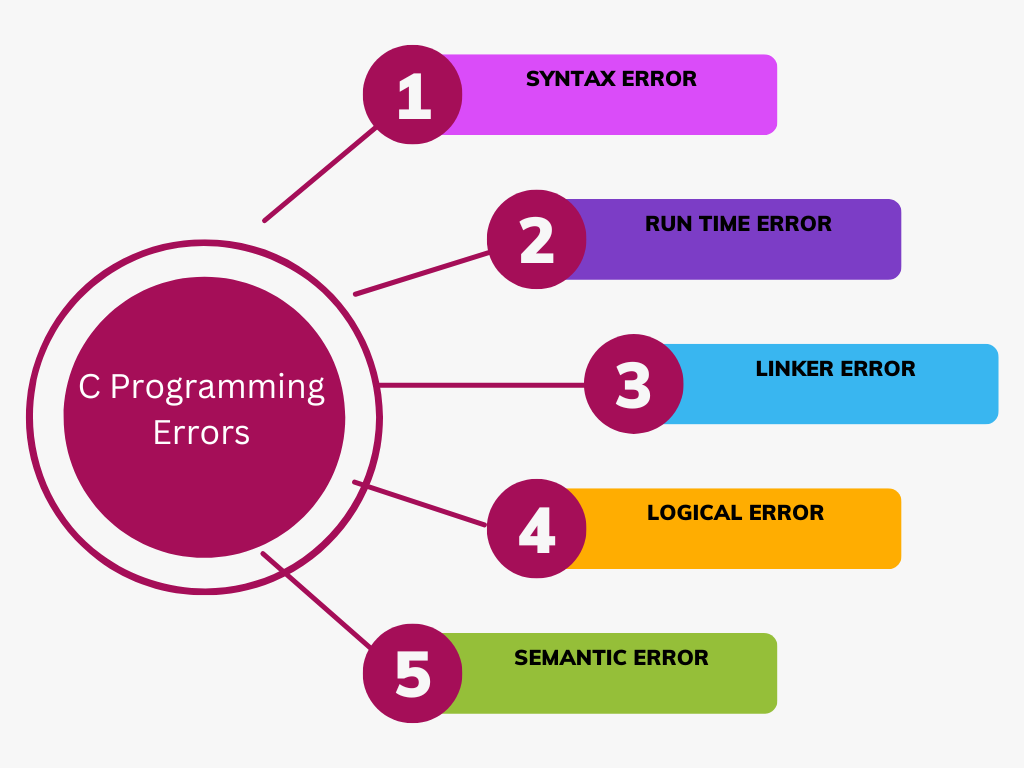
C program errors are an important topic that has been asked in C interview questions for freshers in 2022. Additionally, there are five types of errors that can occur during the execution of a C program. These are as below:
Syntax Errors
Compile-time mistakes are another name for syntax errors. These mistakes have happened when the conventions for C’s writing style or syntax have been violated. Meanwhile, before compilation, the compiler will frequently highlight problems of this nature.
Runtime Errors
This type of error usually happens during the course of the program run. However, the compilation will finish successfully, as this is not a compilation error. Although, these type of errors happens through segmentation fault when a number is divided by the division operator or modulo division operator.
Logical Errors
The expected outcomes consequently might not be received even though the syntax and other parameters are perfect. This happens because of logical problems. As a result, these are known as logical mistakes. Hence, we occasionally follow a loop with a semicolon. This loop is syntactically correct but creates a single blank loop.
Linked Errors
Usually, these types of errors appear when the software is successfully compiled. Thus attempts are made to link the various object files with the main object file. When this issue happens, no executable is produced. No doubt, this might be caused by improper function prototyping, a bad header file, or other things. In the end, a linked error will be produced if main() is written as Main().
Semantic Errors
Accordingly, this error happens when a sentence is syntactically valid yet meaningless. This resembles grammatical mistakes. A semantic error happens if an expression enters to the left of the assignment operator.
4. What is a token in a c program?
The following list includes the various token types in C:
Identifiers:
To begin with, these are the names of the variables, arrays, structures, functions, etc.
Operators:
Likewise, the use of the symbols known as operators is to instruct the C compiler to carry out certain logical, mathematical, or relational processes.
Special Characters:
Further, all the characters other than alphabets and numerals are referred to as special characters.
Constants:
Some fixed values that immute while the program run is known as constant terms.
Keywords/Reserved Names:
Above all, these are terms that have been predefined with specific meanings and are not permitted to be used as variable names.
5. What is the difference between an actual parameter and a formal parameter?
This is a crucial C interview question for freshers as well as experienced which has been found in the year 2022.
| Actual Parameters |
Formal Parameters |
Clearly, the parameters that are sent to the sub-function from the main function are called actual parameters. | On the other hand, the parameters declared at or inside the sub-function are called formal parameters. |
| Importantly, the actual parameters do not have to be variables every time. | In contrast, formal parameters are always variables. |
| Apart from this, actual parameters are always specified in the calling function. | Whereas formal parameters are specified in the called function. |
| no doubt, the values (expressions) provided in the function call are referred to as the arguments when a function is called. | Whereas formal parameters are those that are used in function definition statements that, at the time of declaration, include data types. |
| Likewise, data types are not mentioned in the actual parameters. The value alone is mentioned. | But, the data types of the received values should be included in formal parameters. |
Along with this, the parameters which are specified in a function call are called actual parameters. | In contrast, those parameters which are specified in a function call are called actual parameters. |
6. What do you mean by the structure in C?
Defining C Structure
Initially, we can gather a variety of various data types through the user-defined data type known as structures. Apart from this, each individual part or element of a system refers to as a member in this context. As a matter of fact, it is to note that the word “Struct” is used for forming a structure.
struct [structure_tag]
{
//member variable 1
//member variable 2
//member variable 3
…
}[structure_variables];
Furthermore, in the syntax above, we begin with the struct keyword. Later, giving your structure a name is optional (though we recommend doing so). Further, we have to list all of the member variables inside of curly braces. Obviously, these member variables are simply standard C language variables of various types, such as int, float, array, etc.
Again, this is optional. We can define one or more structure variables after the final curly brace.
Note: Importantly, a semicolon must come after the closing curly brace in the structure type declaration (;).
Example of Structure:
struct Student
{
char name[25];
int age;
char branch[10];
// F for female and M for male
char gender;
};
This struct Student specifies a structure to house a student’s information. This structure contains 4 data fields: name, age, branch, and gender. Structure members or elements are the names given to these fields.
Each member may have a unique datatype. For example, in this instance, the name is an array of the char type, the age is an int type, etc. The structure’s name and tag both contain the word “student.”
7. Why are the functions printf() and scanf() used?
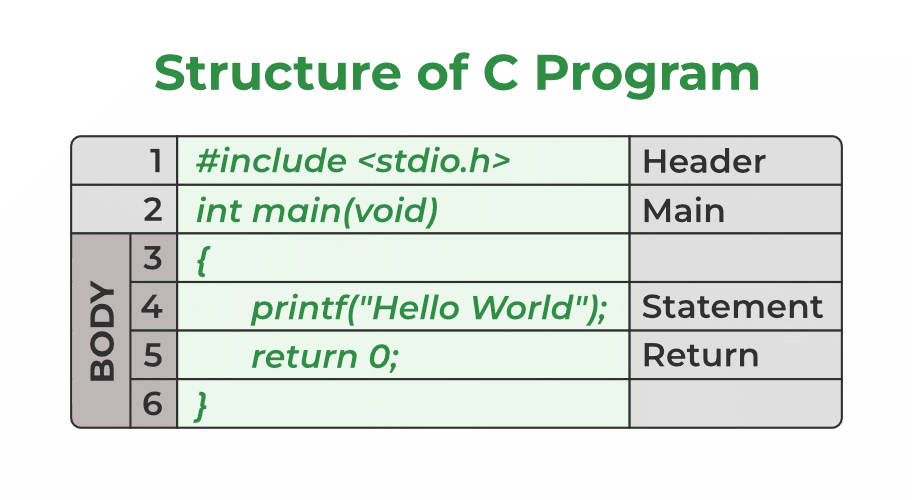
In the C programming language, input and output are handled by the printf() and scanf() functions. Besides, both are built-in library functions that are described in the file stdio.h (header file).
function printf
Utilizing the printf() function is for output. Despite the specified statement prints on the console.
The printf() function’s syntax is provided below:
printf(“format string”,argument_list);
The format string can be %d (integer), %c (character), %s (string), %f (float), etc
scanf() function
For input, the scanf() method is used. It takes input data from the console and reads it.
Let’s look at a straightforward C language example that accepts user input and prints the number’s cube.
#include<stdio.h>
int main(){
int number;
printf(“enter a number:”);
scanf(“%d”,&number);
print .cube of number is:%d “,number*number*number);
return 0;
}
Output
Enter a number: 5
Cube of the entered number: 125
8. What do you understand by the term Preprocessor?

Notably, the preprocessor is a piece of software that performs operations on a source file. Undoubtedly, before submitting it for compilation. In addition to this, the preprocessor allows for the inclusion of header files, macro expansions, conditional compilation, and line control. The 4 Main Types of Preprocessor Directives are below:
- Macros
- File Inclusion
- Conditional Compilation
- Other directives
No doubt, using the preprocessor directives, and enabling or deactivating the debugging statements is post based on our needs.
Example:
- C
// C program to demonstrate the // debugging process using// preprocessor directive ‘#define’.#include <stdio.h> #define DEBUGint main(){ int a = 5, b = 10, sum = 0; sum = a + b;#ifdef DEBUG printf(“At this point,\nsum of a and b = %d \n”, sum); #endifa++; b–;#ifdef DEBUG printf(“\nAt this point,\nvalue of a = %d\n”, a);print (“value of b = %d”, b); #endif} Output: |
At this point,
the sum of a and b = 15
output
At this point,
the value of a = 6
value of b = 9
Further, after the completion of the debugging process, we can remove the macro DEBUG by simply replacing the #define with the # undef directive.
In addition, by such replacement, no debug statements compile as all the #ifdef condition becomes false. In this way, the debugging process for large programs happens using the preprocessor directives.
Thus, the use of #ifdef and #endif for each debug statement seems to be lengthier. Hence, to make the process more concise, we can use another macro SHOW.
Unlike, the macro SHOW which defines in such a way that when macro DEBUG is defined then this SHOW replaces by a printf() statement. Generally, if DEBUG is not defined then SHOW is not replaced by anything.
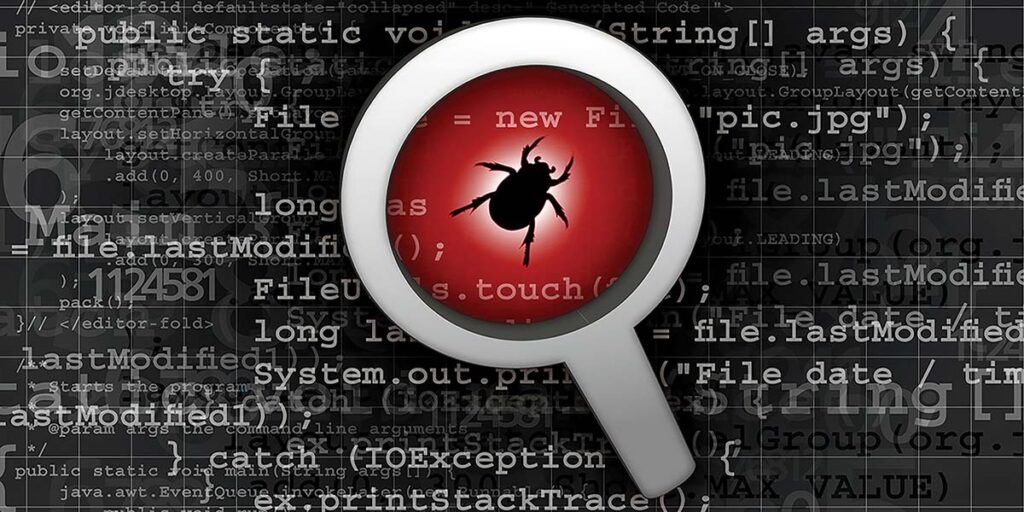
9. What is the use of #line in a C program?
Clearly, the preprocessor #line accepts an argument as the line number. It is also used in a C program for resetting the line number in the code. Here is an illustration of the same
#include <stdio.h> /*line 1*/
/*line 2*/
int main(){ /*line 3*/
/*line 4*/
printf(“Hello world\n”); /*line 5*/
//print current line /*line 6*/
printf(“Line: %d\n”,__LINE__); /*line 7*/
//reset the line number by 36 /*line 8*/
#line 36 /*reseting*/
//print current line /*line 36*/
printf(“Line: %d\n”,__LINE__); /*line 37*/
printf(“Bye bye!!!\n”); /*line 39*/
/*line 40*/
return 0; /*line 41*/
} /*line 42*/
10. What do you think why doesn’t C support the function of overloading?
Firstly, the object code must still contain the symbol names after compiling the C source. In order to prevent function name conflicts, we should offer name mangling whenever we add function overloading to our source. Additionally, many things (like data types) in C convert to another because it is not a rigorously typed language. As a result, in a language like C, the complexity of overload resolution might cause misunderstanding.
Subsequently, the names of symbols preserve during the compilation of a C source. When, if function overloads and implements, a name-mangling approach includes to avoid any name conflicts. As a result, the built binary will have machine-generated symbol names similar to C++.

11. Describe the bubble sort algorithm with the aid of a C program?
Although, this is researched the bubble shot algorithm is an important topic discussed during C interview questions for experienced in 2022. Particularly, a straightforward sorting algorithm called the bubble sort swaps nearby elements if they are out of order frequently. Until the list is sorted, repeated swapping is done.
Program to execute Bubble Sort:
#include <stdio.h>
int main()
{
int a[100], number, i, j, temp;
printf(“\n Enter the total Number of Elements: “);
scanf(“%d”, &number);
printf(“\n Enter the Array Elements: “);
for(i = 0; i < number; i++)
scanf(“%d”, &a[i]);
for(i = 0; i < number – 1; i++)
{
for(j = 0; j < number – i – 1; j++)
{
if(a[j] > a[j + 1])
{
temp = a[j];
a[j] = a[j + 1];
a[j + 1] = temp;
}
}
}
printf(“\n List Sorted in Ascending Order: “);
for(i = 0; i < number; i++)
{
printf(” %d \t”, a[i]);
}
printf(“\n”);
return 0;
}
Output:
Enter the total Number of Elements: 6
Enter the Array Elements: 2 9 7 7 1 -3
List Sorted in Ascending Order: -3 1 2 7 7 9
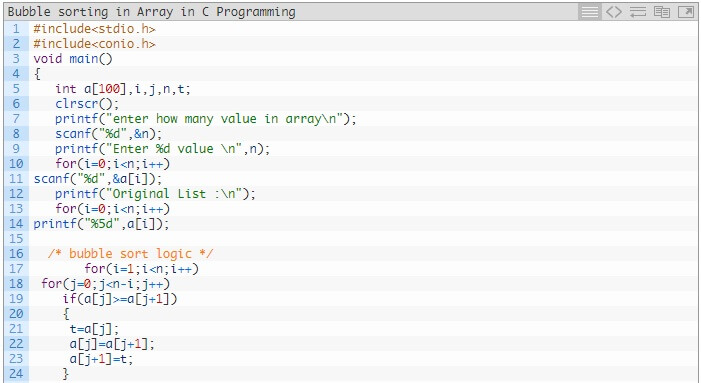
12. What does a data type’s cyclic attribute in C mean? Describe using an example.
The below circumstance is referring to as an overflow of signed char.
#include<stdio.h>
int main(){
signed char c1=130;
signed char c2=-130;
printf(“%d %d”,c1,c2);
return 0;
}
Output is 126, the reason for this is:
Evidently, unsigned char has a range of -128 to 127. For this reason, the value of the variable will vary if we travel in a clockwise direction. As indicated in the figure according to the number if we assign a value larger than 127. If we choose an assignment that is smaller than 128, we must proceed anticlockwise.
13. How can you differentiate between C and Java?
C Programming Interview Questions have this topic as the most common question. James Gosling at Sun Microsystems created Java. Whereas, Dennis M. Ritchie created the C programming language in 1972. Oracle owns it at the moment.
Java is an object-oriented programming language. Unlike, the programming model C is a procedural one.
Platform sensitivity C is susceptible to the platform. Its foundation is the Write Once, Compile Anywhere (WOCA) principle. On the contrary, Java is platform-neutral. Also, the idea behind it is Write Once, Run Anywhere.
As a language that connects machine-level and high-level languages, type C is a middle-level language.
Pointer support is available in C. Even so, Java does not support pointers.
Although there are several libraries that offer threading features, C is not a multithreaded language by default.Java allows for threading.
Undoubtedly, Garbage collection must be carried out by hand in C. In contrast, Garbage Collector performs garbage collection automatically in Java.
Truly, to allocate memory in C programs use functions like malloc(), calloc(), etc. However, C doesn’t have a “new” keyword. This is usually seen as Java supports memory allocation by using the “new” keyword.
14. Make a c program that will reverse a fixed number
Input
| // C program to reverse digits // of a number#include<stdio.h> // Driver code int main() { int n, rev = 0; printf(“Enter Number to be reversed : “);scanf(“%d”, &n); // r will store the remainder while we // reverse the digit and store it in revint r = 0; while(n != 0){ r = n % 10;rev = rev * 10 + r; n /= 10;} printf(“Number After reversing digits is: %d”,rev);return 0; } |
Output:
Enter the Number to reverse: 123
The number After reversing digits is: 321
15. Why would someone utilize an external storage specifier?
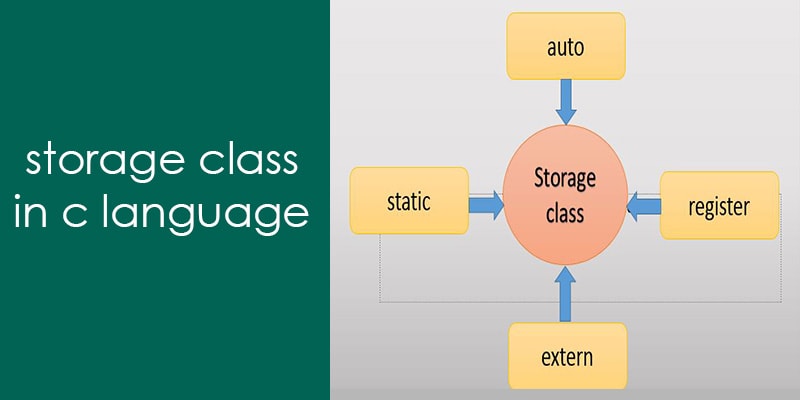
This is usually in all C Programming Interview Questions in all the MNCs. External source specifier declares objects used by the source files. It describes any externally defined variable. The extern keyword adds more repetition, and variables with this keyword. Hence, there is no requirement to declare or define extern functions since they are by default visible throughout the application.
16. What does C mean by near, far, and huge pointers?
Near Pointers:
Not to mention that by all means only a small fraction of 16-bit address space is available to work with. Even so, we are unable to store addresses larger than 16 bits using the near pointer.
Far Pointers:
A far pointer is a 32-bit size pointer. However, it is also possible to access data from an area of the computer that is not accessible to the user at the moment.
Huge Pointers:
A huge pointer is often a 32-bit size pointer. Therefore, it is also possible to access bits that are outside or stored outside the segments.
17. What do you understand by volatile keywords?
Any value is not at all altered by code beyond the present code’s scope. As a matter of fact, the volatile keyword is to stop compiler optimization. Even though a previous instruction requests the value from the same volatile object, the system always retrieves the most recent value. Subsequently, from the memory location rather than storing it in a temporary register at the time requested.

18. What do you understand by statements?
A computer program is a series of instructions for a computer to follow. These instructions are statements in a programming language called C++. Statements may either be one line of code with a semicolon at the end of a block of code encloses in curly braces.
C++ has the following statements:
- Labeled statements
- Expression statements
- Compound statements
- Selection statements
- Iteration statements
- Jump statements
- Try-Catch blocks
- Declaration statements
The topic of statements repeats as one of the important C programming interview questions.
19. Why is function overloading not supported by C?
The object code must still contain the symbol names after compiling the C source. In order to prevent function name conflicts, we should offer name mangling whenever we add function overloading to our source. Additionally, many things (like data types) in C language are convertible to one another. As a result, in a language like C, the complexity of overload resolution might cause misunderstanding.
Evidently, the symbol names preserve during the compilation of a C source. In the case of function overloading implementation, a name-mangling approach includes in order to avoid name conflicts. As a result, the built binary will have machine-generated symbol names similar to C++.
20. What one can understand from a memory leak? How do you stop it?
One of the maxima asked C Programming Interview Questions include this. Depending on the size of the data type, assigning a variable requires space in our RAM (either the heap or RAM). If a programmer consumes memory from the heap without updating the data type that results in the consumption of RAM. Eventually, which could result in a memory leak.
Further, you can track every memory allocation you make in order to prevent memory leaks. Then, decide where you want to erase that memory and do so. Contrary, sometimes, the other method is to link it to GNU compilers using a C++ smart pointer. Also. you can track every memory allocation you make in order to prevent memory leaks. Then, decide where you want to erase that memory and do so. Besides this, another method is to link it to GNU compilers using a C++ smart pointer.
The Next Step to crack the top C programming Interview Questions
Are you looking to advance in your career through C program skills training? In the meanwhile, check out this completely top five selected courses for your C and C++ programming career right now:
C++ Foundation Course with Henry Harvin
C Programming Course by Koenig solutions
Software Programming course by Expert Led online class
C and C++ basics by JNNC Technologies
C programming training with Tops Technologies
However, with the C++ Foundation Online course from Henry Harvin®, one can reap the rewards of outperforming in C programming.
Rating:
9.9 out of 10
Primarily, you will be able to learn all C Programming interview questions as both a fresher and an expert. The following are the reasons:
Training:
After all, 55 Hours of Live Online Sessions
Projects:
Even more, one can possess projects in Pointers, The Cloud, Application Layer, Directory Services, and others
Internship:
Definitely, you’ll receive Internship Support for the learning experience.
Certification:
On the other hand, a Hallmark Certification of C++ Foundation Course from Henry Harvin® Govt of India recognized & Award-Winning Institute can help to display expertise.
Placement:
Nevertheless, 100% Placement Support (1-Year) after successful completion of the course
E-Learning:
Of course, access to different Tools and Techniques, Videos, and others
Bootcamps:
Without a doubt, boot camps conducted over the next year on the Industry demand
Hackathons:
Additionally, free Access to #AskHenry Hackathons
Membership:
To be sure of 1-Year Gold Membership of Henry Harvin® Coding Academy for the C++ Foundation course
Fee:
Generally speaking, the fee is approximately INR 25000.
Recruiting Partners:
Ultimately, granted around 2100+ partners like Paytm, Concentrix, Accenture, and Netflix. etc.
Contact us/via WhatsApp:
9891953953
Address:
Henry Harvin Asia Pacific Head Office, Henry Harvin House,
B-12 Sector-6 Noida (UP)- 201301
Other courses offered by Henry Harvin:
JAVA Foundation with DS & Algo Combo Course,
Programming for Non-Programmers Course
Other Henry Harvin centers:
Delhi, Hyderabad, Mumbai, Kolkata, etc.
Why take up a C programming course from Henry Harvin?
Benefits:
- After all, you get the no. 1 C++ Foundation course in India, with the best learning environment.
- On the other hand, you may learn advanced C programming topics and techniques. This includes the most tricky C Programming Interview Questions also.
- On the other hand, you get complete Hands-On Training with Real Coding Issues.
- Moreover, participants who successfully complete the C++ Foundation course can define their profile with the C++ Foundation course’s global accreditation.
- Besides all, you get CFC and demonstrate expertise by using the CFC Hallmark next to your name, for example. Mr. Naveen Kumar (CFC).
- Additionally, you will be able for attractive positions at Google, Amazon, Microsoft, Facebook, etc.
- At the same time, you get the most demanding and upgraded skill. This skill is to benefit from the opportunity to get promotions.
Salary:
- In the first place, the average Salary is approximately 11 LPA
- In the second place, the average Salary Hike: is up to 90% to 150%
Scope:
Of course, C programming offers numerous job options in fields such as robotics, artificial intelligence machine learning, and so on. On the other hand, C programmers can pursue careers in education, teaching, government, and other fields in addition to computer programming.
Recommended reads
Conclusion:
To repeat, practically all other languages are based on the fundamental language C. Evidently, the base of the programming language is C language. In order to create system applications, this is the most liked language. Finally, other programming languages now outnumber it in popularity. Nevertheless, the most widely used programming language now. No doubt the C interview questions on this page will help you study more while also being useful in actual interviews. To conclude, hope that by using these C programming interview questions. Certainly, you can gain a thorough understanding of the various C ideas. Likewise, you can succeed in your upcoming employment interview.
FAQs:
Dangling Pointers are pointers that point to a deallocated memory block. Eventually, this circumstance causes a Dangling Pointer Problem error. A dangling Pointer occurs when a pointer pointing to a variable exits the scope or when the memory of an object/variable is deallocated.
The increment operator ++ in programming (C, C++, JavaScript, and so on) increments the value of a variable by one. Similarly, the decrement operator — reduces a variable’s value by one. So far, so straightforward. In addition, when these two operators are employed as a prefix and a postfix, there is a significant difference.
The position where the preprocessor looks for the file to include in the code differs between the two types. #include> is used to include pre-defined header files. However, if the header file is predetermined, simply put the name of the header file in angle brackets.
The software will be compiled but will not be run. main() is necessary to run any C program.
The Break keyword’s function is to remove control from the currently executing code block. It can only be found in looping or switch statements.










Recent Comments